A series highlighting the history of the Nusrat Jehan Scheme
Ata-ul-Haye Nasir, Al Hakam
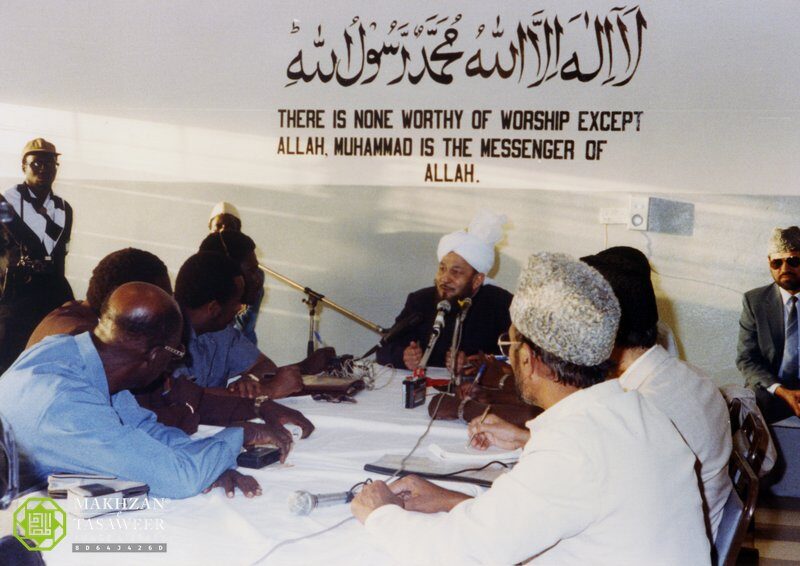
Last year, Al Hakam published an article about the early years of the Nusrat Jehan Scheme, which covered the time of Hazrat Khalifatul Masih IIIrh (“Nusrat Jehan Scheme: Khilafat’s impetus for ‘Africa to Leap Forward’ – A glimpse into the early years (1970-1982)”, Al Hakam, 27 May 2022, Issue 219, pp. 16-18). Continuing the series, this article will present the history of the Nusrat Jehan Scheme during the time of Hazrat Khalifatul Masih IVrh.
During his address at the Jalsa Salana Rabwah 1982, Hazrat Khalifatul Masih IVrh said:
“Among the milestones achieved by Hazrat Khalifatul Masih IIIrh, the one glorious achievement is that after launching the Nusrat Jehan Scheme, he granted it such great guidance that within a short time, the grace of Allah the Almighty filled it with great blessings, and the Jamaat also cooperated in such a manner that one has to greatly admire them. […] This scheme, in the beginning, was initiated with an amount of 5.3 million rupees, and now its budget for only this year is 46.9 million rupees. During this year [1982], by the grace of God, Allah the Almighty has granted cure to 2,20,000 people through this scheme, and enabled the Jamaat to carry out 4,471 successful [medical] operations.” (Silsila-e-Ahmadiyya, Vol. 4, p. 565)
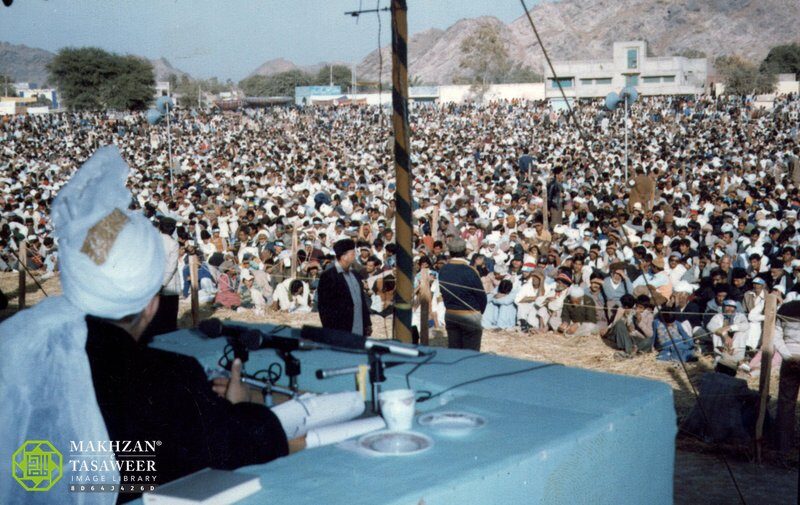
In 1977, Hazrat Khalifatul Masih IIIrh had sent Sahibzada Mirza Masroor Ahmadaa to Ghana under the Nusrat Jehan Scheme. He served there as the headmaster of the Ahmadiyya Secondary Schools in Salaga and Essarkyir. Moreover, he served as the manager of the Ahmadiyya Agricultural Farm in Tamale, and in accordance with the instructions of Hazrat Khalifatul Masih IVrh, he successfully experimented with the growth of wheat in Ghana, which was the first time that it was revealed that wheat could grow in Ghana. He also experimented with the cultivation of soybeans, and it was then that the high nutritional value of soybeans was brought to the attention of the Ghanaian public. Sahibzada Mirza Masroor Ahmadaa served in Ghana up until 1985. (“Hadhrat Khalifatul Masih V – Service in Ghana”, www.reviewofreligions.org)
During the time of Hazrat Khalifatul Masih IVrh, the schools and hospitals in Africa that had been functioning since the time of Hazrat Khalifatul Masih IIra, were brought under the supervision of the Nusrat Jehan Scheme. Hazrat Khalifatul Masih IVrh established a committee for this purpose, which later presented to him its proposals to merge the schools and hospitals working under Tahrik-e-Jadid and Nusrat Jehan Scheme, and then Huzoorrh granted its approval. He announced this merger on 30 June 1985. In accordance with Huzoor’srh instructions, a secretary was appointed to oversee the Nusrat Jehan scheme. Maulana Muhammad Ismail Munir was appointed as the first secretary. (Tarikh-e-Ahmadiyyat, Vol. 26, p. 144)
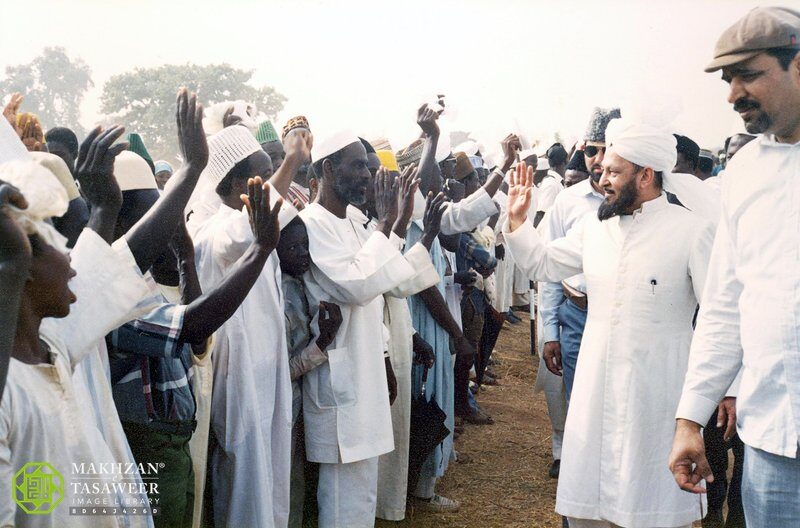
On 22 January 1988, during his Friday Sermon from The Gambia, Huzoorrh initiated the second phase of the Nusrat Jehan Scheme, titled “Nusrat Jehan-e-Nau”:
“The worldwide Jamaat-e-Ahmadiyya has already been granted the opportunity by God Almighty to serve this country as much as possible. Hence, Jamaat-e-Ahmadiyya is rendering such prominent services in The Gambia in the fields of education and health, that whichever dignitary I have met here – the prominent people in the sight of the world, whether they are government officials or holders of other high posts – have all particularly appreciated this [service] and seemed to be very impressed with it.
“Therefore, I have decided – when I say this, it does not mean myself alone, but rather, I speak on behalf of the Jamaat – in fact, it should be said that the worldwide Jamaat-e-Ahmadiyya has decided to extend its cooperation with this country more than before and to search new avenues for serving, and in addition to benefiting the pious-hearted people of this country from the religious and spiritual aspect, we should benefit them from the worldly aspect as well. Moreover, I hope that during my visit to the other African countries as well, such matters will come to light that will make us raise our determination to serve the people of those countries and give us the opportunity to pray for them as well.
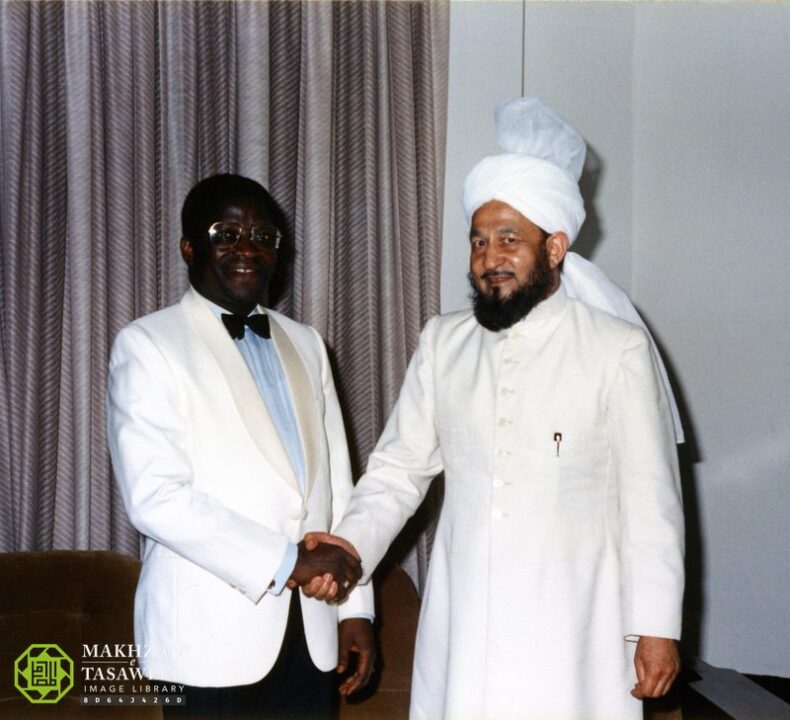
“From a historical point of view, the way Africa has been treated can be summarised as thus that various foreign nations invaded it and carried out various tasks here in the name of ‘progress’. However, in short, they earned it in Africa and then used it in foreign world.
“God Almighty has powerfully instilled this scheme in my heart to turn this history through Jamaat-e-Ahmadiyya, that the whole worldwide Jamaat-e-Ahmadiyya should earn in the [foreign] world and then spend it in Africa, and may God enable Ahmadiyyat to create the means for the healing of those wounds which have been afflicted upon you by others, the foreigners. The foreigners who have looted your wealth, will not return it for sure, however, [God] will enable the true servants of the Holy Prophet Muhammadsa – Jamaat-e-Ahmadiyya – to give them the wealth that was looted [by the foreigners in the past]. At this time, there is not enough time to narrate the details of those schemes on which work has already been started prior to this sermon.
“At the time, in light of the consultation that had already taken place, for instance, during a meeting of your country’s majlis-e-amila, various aspects have been pondered over as to how we can serve The Gambia more than ever before. Hence, in light of those consultations, at this time, I instruct all Ahmadi jamaats of the world to make a firm resolve, and be prepared to serve Africa in all fields with more fervour, for the sake of Allah alone.” (Khutbat-e-Tahir, Vol. 7, pp. 56-58)
Huzoorrh then stated that there is a great need for Ahmadi doctors, teachers, engineers, agriculturists, and industrialists, to devote themselves to this cause:
“This scheme is not related to the financial aspect [alone], but rather, it relates to the ‘wealth’ of expertise [as well]. Thus, in light of the guidance: وَمِمَّا رَزَقۡنٰہُمۡ یُنۡفِقُوۡنَ [‘And spend out of what We have provided for them.’ (Surah al-Baqarah, Ch. 2: V. 4)] everyone is required to prepare for presenting their high expertise to serve Africa, for the sake of God, and to inform me about their credentials. […]
“All these people [belonging to the fields mentioned above] are my addressees, however, I do not address them from the aspect that they come here to make any investment by following the footsteps of those nations who invested in the past and left these countries after looting them, but rather, they have been addressed from the perspective that they should present their prowess and knowledge to serve Africa. […] They should visit here under the system of the Jamaat and formulate such plans that may enable the local people to stand on their own two feet and benefit from their knowledge to enhance their country’s wealth and also benefit themselves as a result. […]
“The need for service [to humanity in Africa] is continuously increasing, and thus, in regards to all these needs, I announce the ‘Nusrat Jehan-e-Nau’. This new department, ‘Nusrat Jehan-e-Nau’ will ponder over all these matters to carry forward the work of the former ‘Nusrat Jehan’ [Scheme] with a new passion and enthusiasm. Moreover, it will formulate all these needs and, insha-Allah Ta‘ala, will enable the Jamaat to serve Africa in new avenues.
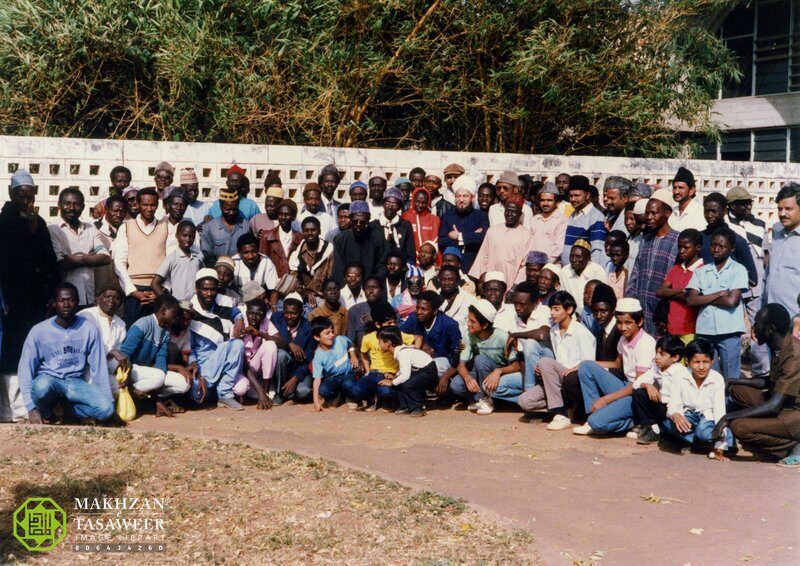
“This is a strange act of God and fortune for The Gambia that the scheme of ‘Nusrat Jehan Awwal’ had been initiated from this very country, meaning your country, and God had enabled Hazrat Khalifatul Masih IIIrh to announce the ‘Nusrat Jehan Scheme’ from the land of The Gambia. Now, for the announcement of its second phase as well, Allah the Almighty has granted this honour to your land. May Allah bless this honour to you and may He enable this scheme, just like the first one, to flourish under His grace and mercy. Amin.” (Ibid, pp. 58-60)
The idea behind this new dimension of this scheme was to help the African nations help themselves. Under this initiative, highly qualified Ahmadis in all fields of life – doctors, engineers, businessmen, and industrialists – had been asked to share their knowledge with the developing countries of Africa. Specialists in these fields devoted their time to offering their skills so that African nations could stand on their own two feet. This initiative was unique because it aimed at training the Africans to become independent of any foreign aid, which in the long run meant ever more shackles for these nations. (“100 Years of Ahmadiyyat in the Service of Mankind”, The Review of Religions, Vol. 85, No. 2, February 1990, pp. 41-42)
During his address at the Jalsa Salana UK 1988, Huzoorrh said:
“Jamaat-e-Ahmadiyya will oversee this work [service to humanity in Africa] and will ensure that the aim of any new connection that is made with Africa, will not be to exploit it, but rather, we will strive to transform the situation of its people. We will change the practice [of the past], where the wealth would move from Africa to other places. Now, our objective, endeavour, prayer, and all desires are that may the wealth begin to move from the outside world into Africa. […] Africa, which has been deprived of its rights, will regain its rights.” (Silsila-e-Ahmadiyya, Vol. 4, p. 565)
During his address at the Jalsa Salana UK 1998, Huzoorrh said:
“Jamaat-e-Ahmadiyya has the opportunity to act upon another interpretation of اَلْعِلْمُ عِلْمَانِ; عِلْمُ الْاَدْیَانِ وَعِلْمُ الْاَبْدَانِ, and that knowledge is شفاء [cure]. One meaning of this saying of the Holy Prophetsa is that عِلْمُ الْاَبْدَانِ means the knowledge of the physical cure, and many of the scholars also give precedent to this [meaning]. Therefore, from this perspective as well, worldwide Jamaat-e-Ahmadiyya has the opportunity, by the grace of Allah the Almighty, to establish a vast number of hospitals and small clinics. In regards to the major hospitals, this task began under the Nusrat Jehan Scheme, and since then, it has expanded to a great extent. The major hospitals that have been established, include 31 hospitals in ten African countries where 35 doctors are serving.” (Silsila-e-Ahmadiyya, Vol. 4, p. 567)
In 2003, under the Nusrat Jehan Scheme, there were 36 hospitals and clinics functioning in 12 African countries, and there were 373 secondary high schools, junior schools, and nursery schools working in eight African countries. The details of these hospitals and schools can be found in Silsila-e-Ahmadiyya, Vol. 4, pp. 567-569.
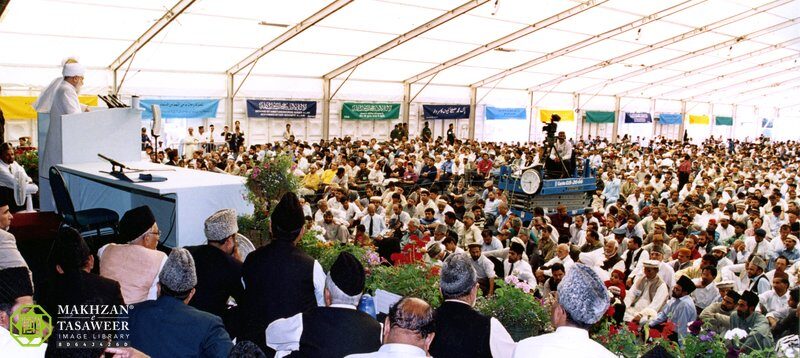
In short, the Nusrat Jehan Scheme continued to flourish during the time of Hazrat Khalifatul Masih IVrh.
Today, as we are living in the blessed time of Hazrat Khalifatul Masih Vaa, this scheme is continuing to flourish and playing its role more than ever before. The worldwide Ahmadiyya Muslim Jamaat is reaping its great fruits and will continue to do so. Insha-Allah!
(We will insha-Allah publish an article next year that will present the history and progress of the Nusrat Jehan Scheme during the first 20 blessed years of Khilafat-e-Khamisa.)

